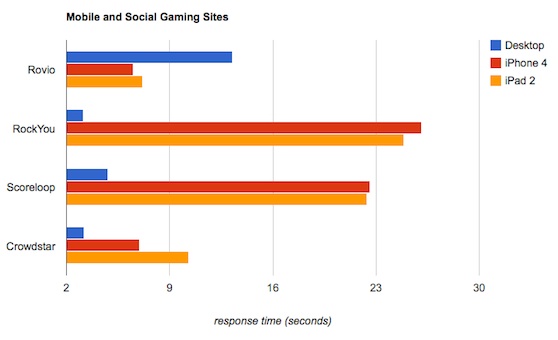Editor’s note: Keynote Systems’ Startup Shootout Index provides some insight into the three-screen challenge now facing anyone with a web presence. It’s the first website performance index to measure load times and completion percentages on desktops, smartphones, and tablets simultaneously. VentureBeat is Keynote’s exclusive media partner, so we’ll be bringing you a fresh set of data from Keynote every month. Check out previous Startup Shootout results.
It looks like attention to mobile devices is becoming increasingly apparent across the Keynote Startup Shootout. That’s no surprise: social mobile gaming is growing, and with it, the need for speed.
A recent research report by Parks Associates on “Trends in Digital Gaming” shows that smartphone and tablet adoption has grown along with the percentage of U.S. gamers who regularly download games or gaming apps to their mobile devices. Game downloaders grew to 18 percent in 2011 from 7 percent in 2008, the firm found. Among tablet owners, 71 percent of adults and 79 percent of teens play games on the device at least one hour per month.
These growth trends verify the importance for game publishers to optimize further and stay competitive on the mobile platform, for both smartphones and tablets. Some of our leading startups in the Shootout have taken this into consideration and we have seen changes in this month’s Social Gaming Startup Shootout.
Rovio
Over the past couple of months, Rovio has been able to greatly improve its response time on smartphones and tablets. In April each took an average of 24 seconds to download. The company has subsequently redirected iPhone and iPad users to a much lighter, mobile-optimized site. The mobile-optimized site loaded in roughly 7 seconds in the July index, making it the fastest social gaming site on the iPad and second fastest on the iPhone. That’s great, but its average response time on the desktop continues to be in excess of 13 seconds — very poor.
By not maintaining a persistent connection, the Rovio website makes a new connection request for each element downloaded, adding up to 150 milliseconds per request. Download around 63 objects and it starts to add up, resulting in poor load time. Not maintaining a persistent connection is a major violation of performance best practices and one that’s only further exacerbated by one’s distance from the content server.
Papaya Mobile
Another social gaming site is also faster on the smartphone than the desktop but for a conscious and strategic reason. Papayamobile.com has a 3.47 second response time on the desktop — average for the category but a bit on the slow side. However, on the iPhone it’s a blazing-fast 2.58 seconds. The reason it’s so fast is that it has required a login as a first step to access the site. Being rather light, the login screen loads quite quickly. But it gives the user no other avenue for interacting with the site.
CrowdStar
CrowdStar arguably had the best overall performance for social gaming websites. Its desktop time was better than average, and the smartphone response time of 6.97 seconds is remarkably good considering it’s delivering the entire site to iPhone users. (Hint: optimize the site for even faster speeds.) The response time for iPad users is better than average and may end up being tolerable when people are connected over Wi-Fi instead of the 3G network.
Tim Murphy is senior manager for mobile quality at Keynote Systems.
VentureBeat's mission is to be a digital town square for technical decision-makers to gain knowledge about transformative enterprise technology and transact. Learn More

